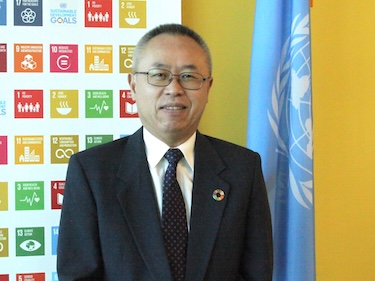By Ramesh Jaura
BERLIN | NEW YORK | 22 September 2024 (IDN) — A new UN report has found a significant upward trend in the development of digital government worldwide as a result of increased private investment in resilient infrastructure and cutting-edge technologies. But the African region, least developed countries, and Small Island Developing States (SIDs) remain below the global average, which underscores the need for targeted efforts to bridge existing gaps and enabling them achive the Sustainable Development Goals (SDGs).
The 2024 edition of the United Nations E-Government Survey – Accelerating Digital Transformation for Sustainable Development, released at the UN headquarters in New York on 17 September shows on a global average the proportion of the population lagging in digital government development decreasing from 45.0 per cent in 2022 to 22.4 per cent in 2024.
At the local level, the Survey continues to assess city portals using the Local Online Services Index (LOSI). The LOSI findings reflect steady progress but also highlight persistent disparities between national and local e-government performance, pointing to the need for focused initiatives to strengthen digital government at the municipal level.
This 13th edition introduces the new Digital Government Model Framework, providing countries with a comprehensive road map for the effective planning, implementation and assessment of digital government initiatives. A short addendum explores the integration of AI in digital government development, emphasizing the importance of maximizing benefits and minimizing risks to achieve balanced governance.
This year’s edition of the Survey, presents Denmark, Estonia and Singapore as leading the 2024 digital government ranking of the 193 United Nations Member States, scoring the highest when it comes to the scope and quality of online services, the status of telecommunication infrastructure and human capacity.
Runners-up in the highest digital rating class are Republic of Korea, Iceland, Saudi Arabia, United Kingdom of Great Britain and Northern Ireland, Australia, Finland, Netherlands, United Arab Emirates, Germany, Japan, Sweden, Norway, New Zealand, Spain and Bahrain. Regional leaders are South Africa (Africa), United States (Americas), Singapore (Asia), Denmark (Europe) and Australia (Oceania).

“The Survey highlights the strides made in digital government and addressing the persistent digital divide, particularly in regions like Africa and Oceania. While the divide may not be fully bridged by 2030, the latest advancements present a significant opportunity,” said Li Junhua, United Nations Under-Secretary-General for Economic and Social Affairs.
“By accelerating efforts and adopting innovative, inclusive solutions, we can ensure that all nations benefit from the transformative power of digital government, making public administration more effective, resilient and equitable,” he added.
For the first time, Member States with very high E-Government Development Index (EGDI) values, comprise the largest share, accounting for 39 per cent of the total number of countries assessed. Overall, 71.5 per cent of Member States are now at the high or very high EGDI levels.
Europe is leading in e-government development, but Asia is advancing more rapidly than the other four regions with 53 per cent of countries in the region having very high EGDI values. In Africa, Mauritius and South Africa have moved up to the high EGDI group, marking the first-time countries from this region have reached the highest level. However, most African countries have EGDI levels below the global average.
Significant disparities in digital infrastructure, connectivity, digital skills and e-government readiness persist within the region. Oceania is characterized by significant variability in digital development with Australia and New Zealand remaining regional and global leaders, while the Small Islands Developing States (SIDS) still face substantial challenges in digital advancement.
The United Nations E-Government Survey, published by the Department of Economic and Social Affairs, is prepared over a two-year period following an established methodology. It looks at how digital government can facilitate integrated policies and services across 193 UN Member States. The Survey will be made available in Arabic, Chinese, English, French, Russian and Spanish, thanks to the collaboration with external partners. [IDN-InDepthNews]
Image credit: UN


